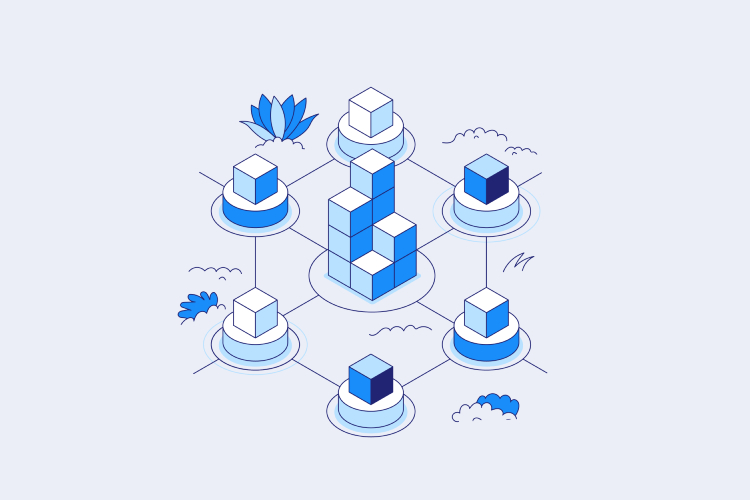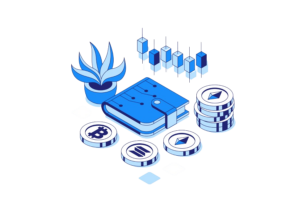Nodes are computer devices that help to uphold the integrity of blockchain networks by storing records of transactions. Nodes can be computers, smartphones, or other computer devices. They serve a vital purpose in the cryptocurrency ecosystem.
Key Takeways
- A node is a computer that maintains a record of transactions for a blockchain network
- There are several different types of nodes such as full nodes and light nodes
- Nodes are essential for keeping cryptocurrencies decentralized
- There is no direct financial incentive to run a node, however doing helps to preserve the security of a cryptocurrency network
How Do Nodes Work?
In order to set up a node for Bitcoin or any other cryptocurrency, you have to first make sure that you possess hardware that is capable of running a node. Second, you have to make sure that your hardware has an operating system that can successfully run a node. Finally, you download the software that will run the node. Once you get it up and running, you too can run a node indefinitely.
Once your node is up and running, it will help to verify cryptocurrency transactions that occur on the blockchain for the cryptocurrency your node is for. For example, if your node is a Bitcoin node, it will help to verify and keep a record of Bitcoin transactions.
Why Are Nodes So Important?
Nodes are so important because they prevent blockchain networks from becoming centralized or able to be controlled by one or just a few parties. When there are thousands of nodes running around the world for a given cryptocurrency, it is impossible for the blockchain network to be tampered with or altered. This is because there is too much decentralization. They also prevent double-spending from occurring.
So, essentially, nodes help to keep distributed ledgers distributed. They keep the system honest. It is common for popular cryptocurrencies to have thousands of nodes. There are currently over 100,000 nodes that support the Bitcoin blockchain.
Nodes are also important because they protect cryptocurrency networks from “black swan events.” A black swan event is a large, unpredictable event that causes extensive damage. For example, imagine that the power grid in the United States suddenly failed due to a meteor strike. This would be a black swan event.
Nodes provide protection from these types of events because even if there is just one node running somewhere in the world, the entire blockchain can be preserved. So, with the example with the meteor strike, even if all of the nodes in North America were destroyed, if there was at least one node running somewhere else in the world, the whole network would be preserved and new nodes could be created based on the surviving node.
What are the Different Types of Nodes?
There are two primary types of nodes, full nodes and light nodes.
Full Nodes
Full nodes are nodes that contain all of the data for an entire blockchain. This includes every transaction that has ever occurred on the blockchain. New transactions are added to the node in real time. So essentially, full nodes are like active copies of a blockchain. Because they contain so much data, they can take up a lot of space on a computer. For example, Bitcoin full nodes take up more than 300 gigabytes of space. However, full nodes for most other blockchains take up less space .
Light Nodes
Light nodes are similar to full nodes. However, they do not store all of the data for an entire blockchain history on them. Instead, they only store enough data to validate whether or not transactions were included in a block. Light nodes are still used to uphold the integrity of a blockchain system, they just do not do all of the heavy lifting that full nodes do. Light nodes are also significantly cheaper to maintain than full nodes.
Nodes Vs. Mining
If a person is running a node, that does not necessarily mean that he or she is mining a cryptocurrency. Essentially running a node just means that you are keeping a copy of the blockchain on a computer that is capable of storing it.
Mining cryptocurrencies on the other hand means that you are actively participating in the verification of new groups of transactions (blocks) that get added to the blockchain for a specific cryptocurrency.
To mine cryptocurrencies, you have to run a node in most circumstances. So, all miners are nodes, but not all nodes are miners. A lot of the people who run nodes are, in fact, miners however. This is because there is a financial incentive to mine cryptocurrencies.
What is the Purpose of Running A Node?
The primary purpose of running a node for a cryptocurrency is that it helps to keep the blockchain network for a given cryptocurrency decentralized, efficient, and honest. So, many of the people who run nodes for cryptocurrencies are cryptocurrency enthusiasts who want to keep the blockchains for certain cryptocurrencies working well. In most cases, there are no tangible financial incentives to run a node for a cryptocurrency. That is why many people mine in addition to running nodes.
Can Anyone Run a Node?
Yes, anyone can run a node for a cryptocurrency. That is part of the beauty of nodes and decentralized cryptocurrencies. To run a node for Bitcoin or another popular cryptocurrency you may need to buy special hardware though. Special computers called Raspberry Pi’s are very popular for running Bitcoin nodes. They only cost about $50. Therefore many people around the world can easily afford to get one up and running.
Conclusion
It is relatively simple to run a node for a cryptocurrency. Some nodes can be easily run on a personal computer or even a smartphone. But, as blockchain networks grow larger and larger, special computers such as Raspberry Pi’s will be needed more and more to run nodes. Nodes are highly beneficial to cryptocurrency networks because they preserve integrity and add extra security. The more nodes that a blockchain network has, the more decentralized it is.









